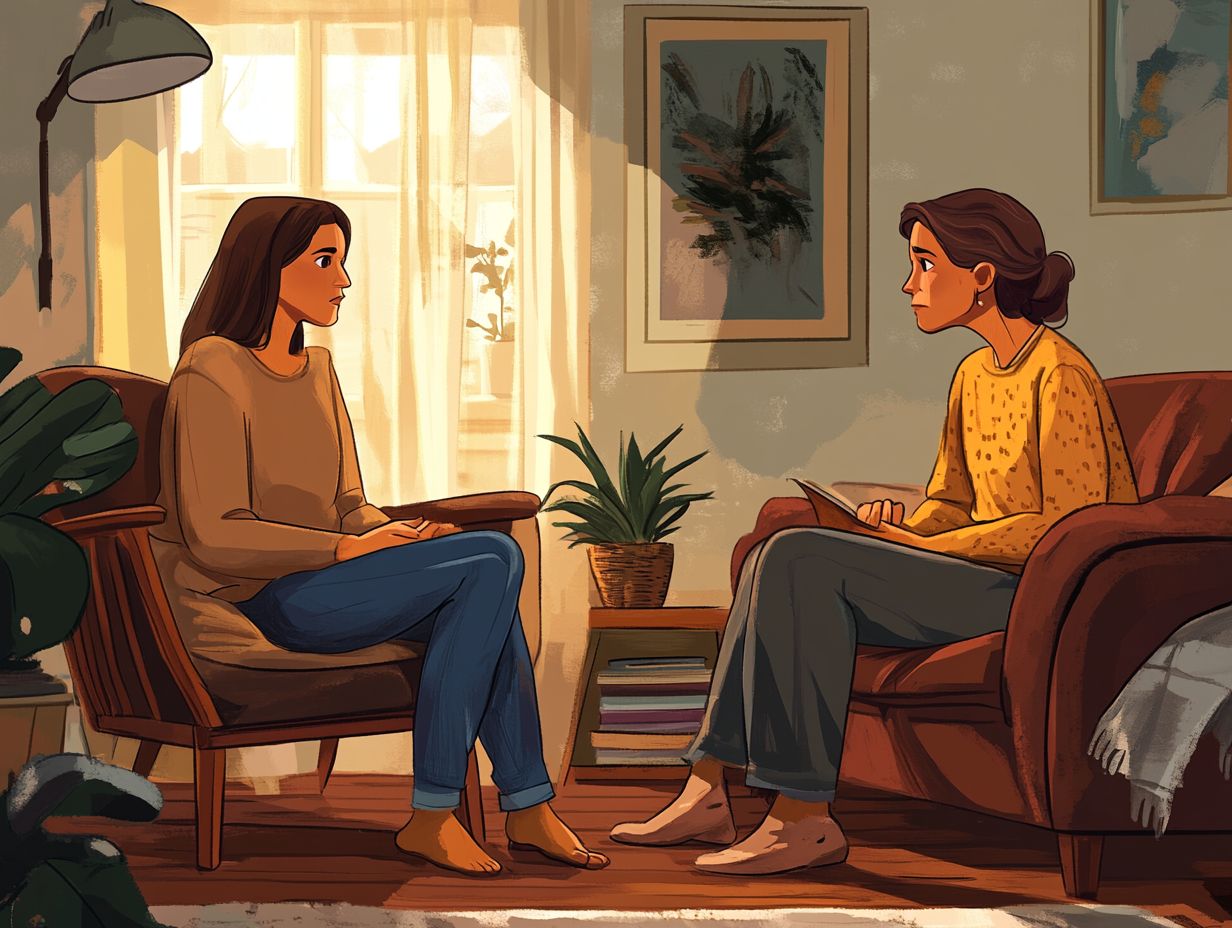Discussing a cancer diagnosis with close friends and loved ones is a vital step in garnering the emotional support necessary to navigate this challenging journey. The importance of sharing your diagnosis lies in reducing isolation and fostering connections that can help manage feelings about cancer, treatment options, and overall communication with your healthcare team.
Preparing yourself for these conversations involves organizing thoughts and managing emotions through mindfulness and counseling. Seeking help from a mental health expert can provide professional advice. Choosing the right time and place to share your news ensures privacy and facilitates open, honest communication.
By addressing concerns, handling diverse emotional reactions, and maintaining communication, you can strengthen bonds and create a support network that aids in coping with the emotional burdens of cancer. Discussing treatment and preparing for the future with your loved ones can provide comfort and understanding.
Key Takeaways:
The Importance of Support

Support during a cancer diagnosis is crucial for coping with the emotional burden.
Emotional support from family and friends helps manage feelings, treatment options, and communication with the health care team.
Open conversations about prognosis and coping strategies create comfort and understanding, aiding patients and loved ones in facing cancer together.
Why it’s Important to Discuss Your Diagnosis with Friends
Discussing your cancer diagnosis with friends is important for emotional support, reducing isolation, and sharing coping strategies. Engaging in supportive conversations and expressing feelings about cancer can be therapeutic.
These discussions help articulate feelings about prognosis and death anxiety, providing comfort and connection during a challenging journey.
Friends offer insights and a listening ear, aiding emotional resilience needed in fighting cancer.
Preparing Yourself for the Conversation
Preparing for conversations about a cancer diagnosis involves organizing thoughts, listing questions, and practicing key points to discuss with the healthcare team and loved ones. Addressing fears and communication difficulties can also aid in these discussions.
Preparation helps manage emotions and ensure clear communication about treatment options and emotional needs.
Managing Your Emotions and Expectations
Managing emotions and expectations during cancer discussions involves using mindfulness and counseling to communicate effectively. Seeking help from a mental health counselor can assist in managing emotions and expectations.
Mindfulness helps individuals become aware of their feelings, promoting calm conversations.
Counseling offers a safe space to explore emotions surrounding a cancer diagnosis.
Open communication with family and strong support systems reduces emotional distress.
Approaching the Conversation
Approaching conversations about a cancer diagnosis involves selecting an appropriate time and place, and clearly communicating your treatment wishes to loved ones.
Begin by choosing a comfortable setting and ensuring privacy.
Explain the diagnosis using clear, simple language and address any questions honestly.
Share treatment goals and preferences to align understanding and support.
Allow space for emotional reactions and be prepared for ongoing discussions.
Choosing the Right Time and Place

Choosing the right time and place to discuss a cancer diagnosis ensures privacy and comfort.
A suitable setting allows for honest communication and emotional readiness.
Privacy minimizes distractions, and supportive figures enhance openness.
How to Start the Conversation
Starting the conversation about a cancer diagnosis involves clearly expressing your feelings and stating the need for discussion. Begin with a simple statement, like “I have important news about my health” or “I need to talk about my recent diagnosis.”
Sharing your emotions and inviting others to ask questions can facilitate a supportive dialogue.
Handling Reactions and Responses
Handling reactions and responses to a cancer diagnosis involves preparing for various emotions from family members and friends, such as concern or negativity. Understanding family dynamics and adult children’s concerns can be crucial in these situations.
Effective methods include:
- Setting boundaries for discussions,
- Seeking support from counseling,
- Informing loved ones about your preferred communication style.
These strategies help manage emotional interactions effectively.
Addressing Concerns and Questions
Addressing concerns and questions about a cancer diagnosis requires open communication and transparency about treatment options. Discussing death anxiety and the truth about prognosis can also help family members cope.
Encouraging family and friends to ask questions can help them understand the diagnosis and provide emotional support.
Sharing feelings openly about treatment can strengthen trust and support networks.
Discussing concerns openly fosters stronger collective coping strategies.
Dealing with Negative Reactions
Dealing with negative reactions to a cancer diagnosis involves recognizing diverse emotional responses and encouraging supportive dialogue. Planning care and discussing wishes can help in handling sensitive topics and family disagreements.
Coping mechanisms include:
- open communication,
- seeking support from counselors,
- joining support groups.
These strategies help manage emotional distress and improve interactions with loved ones.
Maintaining Communication and Support

Maintaining communication is vital during a cancer journey to keep friends and family informed and strengthen emotional support. Joining support groups and engaging in community activities can help maintain normalcy.
Regular updates help sustain supportive conversations, aiding in coping and sharing experiences.
How to Keep Your Friends Updated
To keep friends and family updated on your health status during cancer treatment, use regular check-ins, social media updates, and family meetings. These methods facilitate open communication and support from caregivers and loved ones.
Social media platforms allow for broad communication, enabling you to share updates with many people at once.
Family meetings provide personal interaction, facilitating deeper discussions and support.
Maintaining open communication with your healthcare team and loved ones ensures a strong support system.
Ways to Continue Supporting Each Other
Ways to continue supporting each other during the cancer journey include:
- Joining support groups
- Scheduling regular conversations
- Engaging in shared activities
Support groups provide shared experiences and open communication, while regular conversations ensure emotional check-ins. Shared activities help maintain connection and offer distraction from stressors.
Frequently Asked Questions
How can I discuss my cancer diagnosis with close friends?
Discussing a cancer diagnosis with close friends can be difficult, but it’s important to have a support system during this time. Here are some tips to help you navigate these conversations:
Who should I talk to first about my cancer diagnosis?

It’s completely up to you who you tell first, but it may be helpful to talk to someone you trust and feel comfortable with. This could be a close friend or family member.
How do I bring up my cancer diagnosis in conversation?
There’s no right or wrong way to bring up your diagnosis. Some people prefer to be direct and say something like, “I have cancer and I wanted to talk to you about it.” Others may feel more comfortable easing into the conversation by mentioning they have some health news to share.
What if my friends react negatively to my cancer diagnosis?
It’s normal to feel hurt if your friends react negatively to your diagnosis. Remember that everyone processes news differently and your friends may need some time to process the information. Give them the benefit of the doubt and try to communicate openly about your feelings.
Can I ask my friends for help during my cancer treatment?
Absolutely! It’s important to have a support system during cancer treatment and your friends may be able to provide emotional support, help with daily tasks, or simply be there to listen. Don’t be afraid to ask for help when you need it.
Should I be concerned about how my cancer diagnosis may affect my friendships?
It’s normal to worry about how your cancer diagnosis may affect your friendships. However, true friends will stick by you and support you through this difficult time. If any friendships are negatively impacted, it may be a sign that they weren’t as strong as you thought and it’s okay to focus your energy on those who are there for you.





